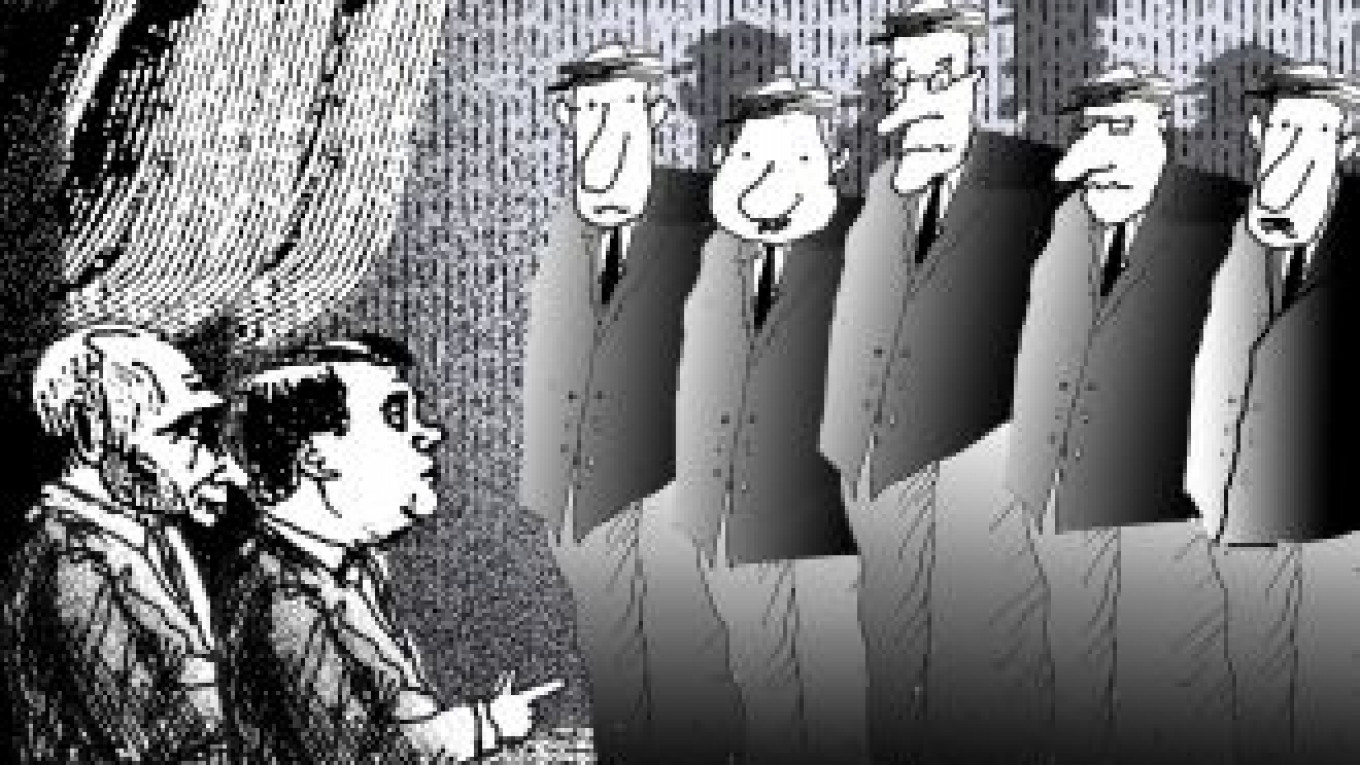There is nothing intuitive in saying that former Mayor Yury Luzhkov’s successor will have much better relations with the federal government than he or his administration had. That is because the next mayor will be appointed by the president and will have the support of the prime minister’s office and key ministries. In practical terms, that should mean that the federal government may ease its previous intransigence toward providing funding for projects in the capital and should more proactively help the city advance its goal of becoming a more important business and financial center.
While that optimism is somewhat justified, the harsher reality is that the Finance Ministry doesn’t have much spare cash to give. For Moscow to achieve the status of a greater financial center, there will have to be much greater progress in reforms at a national level.
That said, the hope, widely expressed last week, is that the new mayor will be able to leverage off a better relationship with the Kremlin and White House and will be better placed to end current reported inefficiencies in the way the city conducts its business. There is a good chance that changes in the Mayor’s Office will act as a catalyst for stronger regional economic growth. There is no question that Luzhkov and his team had almost full control of the main economic drivers in Moscow and tightly controlled the city’s development. That was precisely the problem. Luzhkov and his team had an entirely different set of business relationships and economic priorities. Skirmishes with the federal government, particularly over infrastructure and real estate developments, were frequent, and those disputes undoubtedly held back the pace of growth in the city’s economy.
As recently as August, city administrators put forward a 4 trillion ruble ($130 billion) plan to help improve Moscow’s transportation infrastructure. The city had previously allocated 300 billion rubles to the project from its own resources and indicated that it was prepared to raise this to 1 trillion rubles. The rest had to come from the federal budget. Not surprisingly, the Finance Ministry rejected the proposal out of hand. But while the Finance Ministry is focused on capping spending plans everywhere, a better relationship between City Hall and the government would surely have resulted in a compromise deal rather than an outright rejection. Few would deny that the city needs the additional 365 kilometers of railroads and the 120 kilometers of metro lines that the plan envisaged.
But while Finance Minister Alexei Kudrin’s priority is to keep the budget deficit as low as possible over the next three years and to have major developments funded with project finance and via public-private partnerships, political proprieties will play an important role next year. United Russia is determined to defend its dominant position in the 2011 State Duma elections, and whoever is Moscow mayor will play a key role. Luzhkov had always delivered well on bringing out United Russia votes among Muscovites, but the problem is that even if he were allowed to complete his term in office, which would have expired in July, there would have been a five-month gap between next July and the Duma elections in December, assuming, of course, that he wouldn’t have been reappointed to another term. Although five months is too short to cultivate a new mayor for one of his most important functions — canvassing votes for United Russia in Duma and regional elections — one year is much better. That is one reason why President Dmitry Medvedev and Prime Minister Vladimir Putin decided to fire Luzhkov now — to have enough time to groom the next mayor for the 2011 Duma vote.
No less important, it is crucial for the Kremlin and White House to ensure that the most favorable economic backdrop is in place for the 2011 and 2012 presidential elections. That will most likely mean a more favorable response to funding requests from the new city administrators than the response that Luzhkov received. The government will want to be visibly seen to be supporting the city’s development and avoid the risk of being accused of blocking it.
But while the change in the Mayor’s Office and the improved relations with the federal government will have a positive impact on some projects in the city, of itself, it will not make a huge difference to Moscow’s ambition to become a more important financial and business center. This, of course, is not just an ambition of the city administrators but is an important part of Medvedev’s plan for modernizing Russia.
Sorting out the city’s notorious traffic problems and providing a greater number of affordable hotel rooms is important. What is even more important is to improve the perception of Russia as a place to do business and in which to invest. Right now, that perception among international portfolio investors and strategic business investors is very poor. The discounted valuation of the Russia stock market relative to other major emerging market stock markets is near a historic high. If you don’t count investment in extractive industries and in offshore centers, such as Cyprus, the amount of real foreign direct investment is negligible. If Russia were to get the same foreign direct investment relative to gross domestic product as other big developing economies, the annual investment would be close to $75 billion. This is more than enough to accelerate the diversification of the economy. For that to happen, though, risk-adverse companies, such as Wal-Mart, need to see an improvement in the investment and business climate in Russia. Investors’ perceptions about Russia are shaped more by the negative (although accurate) stories they read in the media than the overpriced hotels and horrible traffic jams.
At the same time, however, there is much progress being made. Medvedev’s repeated calls for modernization are seen as a pragmatic and credible change of priorities within the government. Some reforms have already taken place — for example, Russia will soon have a much-needed law against insider dealing — and many more laws that will help improve the business environment are making their way through the legislative process. Finally, it also seems that Russia is getting serious about World Trade Organization entry in 2011. That will have a big positive impact on perception. In any case, Russia has decisively started down the road to improve the investment and business climate in Russia — and Moscow in particular. The change of mayors in Moscow is an important part of this process.
Chris Weafer is chief strategist at UralSib Capital.
A Message from The Moscow Times:
Dear readers,
We are facing unprecedented challenges. Russia's Prosecutor General's Office has designated The Moscow Times as an "undesirable" organization, criminalizing our work and putting our staff at risk of prosecution. This follows our earlier unjust labeling as a "foreign agent."
These actions are direct attempts to silence independent journalism in Russia. The authorities claim our work "discredits the decisions of the Russian leadership." We see things differently: we strive to provide accurate, unbiased reporting on Russia.
We, the journalists of The Moscow Times, refuse to be silenced. But to continue our work, we need your help.
Your support, no matter how small, makes a world of difference. If you can, please support us monthly starting from just $2. It's quick to set up, and every contribution makes a significant impact.
By supporting The Moscow Times, you're defending open, independent journalism in the face of repression. Thank you for standing with us.
Remind me later.








